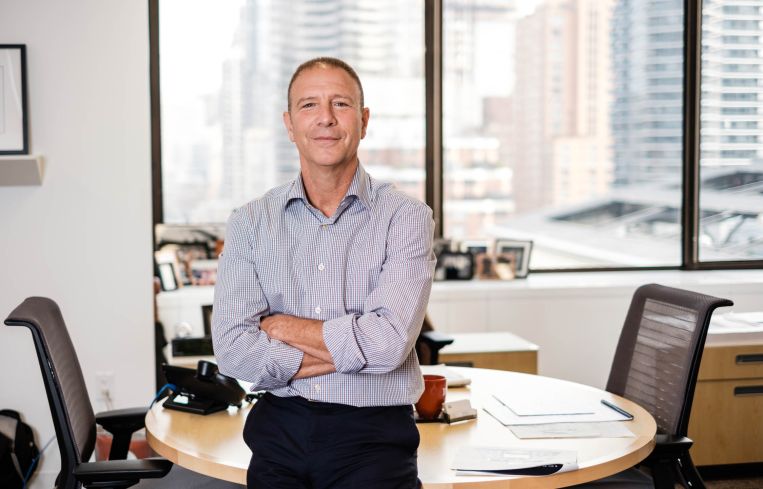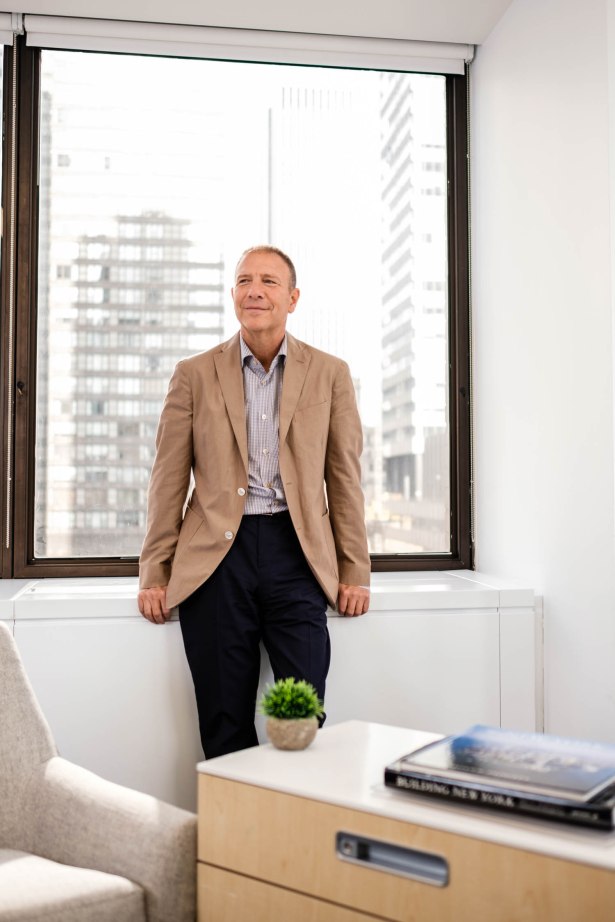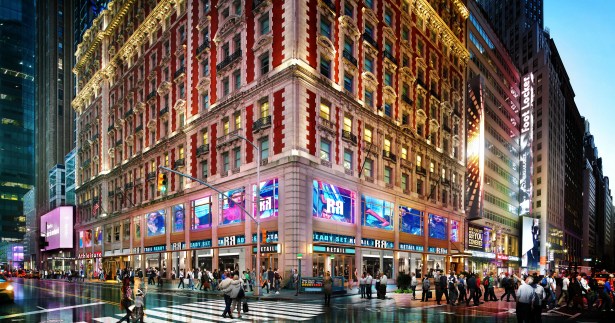Ripco’s Peter Ripka Is Building a Better Team While Expanding the Business
By Lauren Elkies Schram October 30, 2018 9:00 am
reprints
At a time when there is a reshuffling among midsize and middle-market-centered commercial real estate firms, brokerages are looking for ways to reinvent themselves.
At Ripco Real Estate, the firm has made many changes in the last couple of years as it resets for the future. Those have included hiring its first COO, wooing powerhouse retail pro Gene Spiegelman from Cushman & Wakefield, opening a Brooklyn office, partnering with U.K.-based Time Retail Partners to assist retailers in their transition to the New York City market and expanding into third-party property management, with an eye toward other lines of business.
Seated at his round desk in the entryway to the bullpen at the firm’s Manhattan offices at 150 East 58th Street is the team’s “coach,” Peter Ripka, who co-founded the company in Long Island, N.Y., with Todd Cooper in 1991 (the Manhattan office opened in August 1998). In an effort to not let all the old ways die, Ripco’s telephone hold music is still the Grateful Dead’s live recordings, something its brokers are proud of.
Since the firm’s inception, it has grown to 70 agents in four offices (in Manhattan, Brooklyn, Long Island and New Jersey) and leased more than 15 million square feet of retail space. Ripka said the firm is split 50-50 between agency and tenant rep work. Ripka’s recent deals have included representing Related Companies along with Ripco’s Brian Schuster in an 80,000-square-foot lease in Bronx Terminal for Food Bazaar Supermarket. When it opens in spring 2019, it will be the largest supermarket in the borough. Earlier this year, Ripka was one of the Ripco brokers representing Target in its lease of 21,000 square feet at 520 Second Avenue at East 29th Street.
He is also helping market Ceruzzi Properties and Kuafu Properties’ remaining retail piece at the base of their upcoming 18-story condominium on East 86th Street and Lexington Avenue. He helped arrange the 18,500-square-foot Old Navy deal there at the end of last year.
Ripka, 55, a husband of 29 years and father of three (25-year-old twins—one of whom works in real estate and is soon starting at Gazit Horizons—and a 24 year old) is also a landlord with an investment in Bridges Development Group. Bridges did a deal this year with Target at 5200 Kings Highway in the Flatlands section of Brooklyn. Ripco represented both sides in the transaction.

Commercial Observer talked to Ripka—who resides on Long Island—about Midtown, how he got his start in the business and the changes ahead for Ripco.
Commercial Observer: You grew up on Long Island?
Peter Ripka: Yeah. I was born in Queens. And I lived there until the middle of third grade. I have vivid memories of living in [Elmhurst in] LeFrak City. In fact, decades later when we made a Target deal with the LeFraks in Jersey City, [N.J.] and we got paid, it made me feel like I got all my family’s rent back and then some.
How did you and Todd start Ripco?
In 1991, we were roommates in Long Island. He was working at Kimco.
How’d you two meet?
I met him through a mutual friend that I met in law school named Ken Breslin, whose family is in the real estate business. And I started there actually—at Breslin Realty. [It’s] a shopping center developer. I was there for four to five years.
This was after law school?
Yeah. I went to Northwestern [University] for undergrad and then I went to Hofstra [University]. Two great things came out of law school—I met my wife and it was my path to meeting my partner, Todd. I graduated a year early because I knew I wasn’t going to practice law.
Why did you bother doing it?
I was fulfilling my mother’s dream, I like to say.
Did it?
For that moment in time.
So what was Todd doing at the time?
Todd was working—his father started a company called Kimco.
What was life like living with Todd?
Kenny was out a lot—the third [roommate]. He was in the city, he had an apartment in the city. So, Todd and I spent a lot of time together and we played stickball.
Stickball?
Yeah, anything we could do to play sports. Sometimes with two people, what are you going to do? We ran, we played stickball, we played a little tennis. But really we talked about business because he was in the shopping center industry and so was I. And we had common values.
Which were?
Honest, hard working, love of family and friends, truthfully. We’re both gentle, in a way.
How did you come up with the idea to launch a company?
One night he basically said to me that Kimco was growing really fast and that he felt like it was his father’s company. He just kinda wanted to do something on his own. And he asked me if I wanted to go into business with him.
We started on Long Island. It was in the early 90s and we ordered a phone book for every single county and borough in the metro New York area, from Ocean County, N.J., up through New Haven, Conn. We had a Haagstrom map and would look for every single Pathmark. For every single Pathmark, we’d put “P.” Every Caldor, “C.” Every K-Mart, “K.” We wanted to know where every major retail property was in the whole metro New York area.
Are you the head of this office?
No. I don’t view myself that way and I’m not. Andrew [Mandell] and Richard [Skulnik] really are. Andrew runs the meetings—Andrew and Richard run the meetings.
How do you see your role here?
I feel like a player-coach.
You’re making a lot of changes to the company today.
I wouldn’t even view any of this as change as much as evolution. We always felt as equal to any other [firm] in terms of talent or intelligence or abilities, but we weren’t as well known, but we just kept doing our thing. More and more people started joining. We needed to put more systems in place. We moved from mom-and-pop to a midsize firm.
We were feeling that because of different changes going on in the industry, that top brokers in Manhattan would join us and we knew we needed to upgrade our game a little bit. Some of them like private offices, for example, so we built some. For people that have had offices, it’s hard to say, work in our open environment. So we wanted to be flexible.
What do you think about the problem with the mid-level market?
Don’t you think that’s overblown? What happened? Town went bust and Eastern Consolidated went bust. Who else? Even still, companies go in and out of business and there’s always consolidation going on.
Are you afraid you’re going to lose your mom-and-pop feel?
Of course you have to work hard to maintain culture. I think culture is an overused word and we are really lucky because we have it organically.
Now that you moved the Brooklyn brokers to Brooklyn what’s the plan with the excess Manhattan space?
We want to grow it, and we want to bring in seasoned individuals, people [our brokers] would like to work with. Maybe they work in a bigger firm. Maybe they work in a smaller firm. Maybe they’re not close with the people in their own organization. And so for us, if you’re likeminded and sharing and you care about your family, you care about other people, all of those things come into play. You don’t have to be a family person. It’s not a requirement. Just pointing out different things that feel like make you a likeminded person, you have a lot of friends. It’s only happened two or three times where we’ve had brokers that even though they were really talented they were sucking too much oxygen out of the room.
Meaning?
Meaning that there was always a problem. More often than not it would revolve around splits, truthfully. We don’t really have problems when it comes to our splits. But when we sit around the table, everyone kind of knows their contribution. I like to joke around like: “What do you think you should get?”, “What do you think you should get?”, “What do you think I should get?” It comes out to 150 percent. “Why don’t we all go down the exact amount to get to 100 percent and then we can get out of the room and go back to work?” And almost everyone says, “yes.” And there have been times when one or two people are like, “I want what I feel is fair,” and then it happens again, and then it happens again. It could be a good broker. Like, you know what? You’re sucking too much oxygen out of the room as far as I’m concerned. As successful as you are, you need to go to a different place.
Do you plan to do any other lines of business?
That’s a good question. And we’re definitely exploring some. We’re going into the property management business—we started a property management business about a year ago. We partnered with a group that was in it already. They were called Metro Capital Holdings. Basically he’s a friend of ours who was managing retail properties in the suburbs. He owned them and managed them. We were in the same building in Long Island. So he moved into our office with his team. We formed a separate entity to manage properties. It’s called MetroRipco Management.
You’re also part of another company.
Bridges.
How does that work? It’s just you personally at Ripco?
And Todd.
It’s a retail development company.
It is. It’s a retail development company. And the short story is, there’s a very talented individual who we’re friends with and we trust. He wanted to start a development company for the outer boroughs.
How long ago was that?
A year or year and a half ago and you know, it’s kind of every broker’s dream to own some things in their lives. We don’t have delusions of grandeur. Seriously. If we can find some small deals and own some property that’s the goal. He’s built some projects in the boroughs from some of the past places he’s worked at.
How many properties does Bridges have?
Well, we just started so we have three deals we’re working on [including 5200 Kings Highway, which it owns].
You have an office in Long Island and you live in Long Island. Why work out of the Manhattan office?
We’re in our fourth space in Jericho, three minutes from my home if I make a light. I live in the next town. But I love coming into the city. I love the action in the streets here.
What do you do on weekends?
My wife and I are always begging our kids to hang out with us. I’ll exercise on the weekends. I don’t get to exercise during the week as much as I would like but I always make a point on the weekends.
What do you do for exercise?
In the summer I swim. I ride bikes with my wife. In the winter I’ll kind of use the elliptical [trainers] and lift weights.
Do you guys have a second home?
We have a house out east, a townhouse out east in Southampton. They built a townhouse complex.

Tell us about what you guys are doing in Midtown.
[Ripco has an assignment at] the absolute center of Midtown, the center of Manhattan, the center of the U.S.A., and the center of the world—it’s at the corner of 42nd Street and Broadway at 6 Times Square. [Invesco’s] 6 Times Square is approximately 44,000 square feet over three levels. We are the leasing agents and the space sits directly across from the busiest subway stop in the entire New York City subway system.
How would you describe the current state of Midtown retail?
Like markets and trade areas everywhere, Midtown is not immune to the changes and evolution of retail. Though what makes Midtown strong and stable through good and bad and thick and thin is a massive amount of daytime population, tourists and the major mass transportation hubs that all lead to foot traffic and pedestrian activity throughout the streets and avenues. In the suburbs, it’s well known that greater automobile traffic passing a site leads to greater sales and revenue. In the same vein, in Midtown, all the pedestrian activity will also always lead to sales and revenue as well which is why the Midtown markets will always hold up.
What other assignments do you want to highlight?
I’m leasing [50,000 square feet for Jenel Management at 215 East Fordham Road] in the Bronx, which I love. I love going there; my family’s from there. Sometimes I’ll drive by where my grandparents lived when I’m heading over to Fordham Road. My grandfather owned a Laundromat. My papi delivered seltzer bottles and they were hard-working.
And I know of course it’s a hard time right now in retail—people are concentrating on digital and e-commerce—but a broker has to wear very optimistic blinders and get people to get to the site. You gotta put your game face on in the morning.
Some days you wake up you might have a cold. You can’t show it. I think about Kobe Bryant and Michael Jordan and my favorite athlete of all time—Arthur Ashe, who was a tennis player. He was a gentleman. He was quiet. This is why I love him—he was a quiet competitor. He was born in Richmond, Va., he had to play in the black park and so he grew up in the era of civil rights, where there was still a fair amount of discrimination. The way he overcame and maintained his dignity— I just have a lot of admiration for him. [Anyway, these athletes] put their game faces on. These guys, they wake up on the wrong side of the bed in the morning. They have bad moods. They have colds. But when they get to work, they work. They put it behind them—they play the game.



